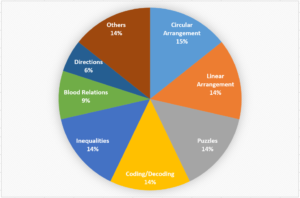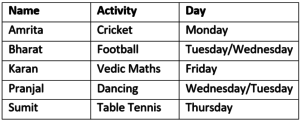Looking for Easy tricks to solve reasoning questions for bank exams? How to solve reasoning questions quickly? Such thoughts often bother Banking Exams aspirants. This blog is specifically written to answer all such queries. We will also discuss tricks to solve reasoning questions in bank exams.
Recently SBI has released the notification for SBI Clerk exam. Many of you must be eyeing it and might be thinking of kick-starting your preparations. Reasoning Section is one of the integral parts of all such Banking Examinations. It forms around 35% of the Prelims Exam and around 25% of the Mains Exam. Thus, a serious aspirant should take this section seriously and prepare for it very thoroughly.
Reasoning section is one of the easiest to master if prepared in the right manner. With enough practice, one can quickly solve all the questions from this section with very high accuracy. Solving Previous Year SBI Clerk Papers also goes a long way in getting you acquainted with the pattern and types of questions asked. With some useful tricks to solve reasoning questions for bank exams, one can easily make this section his/her forte.
Unlimited Banking Tests – Rs. 499
The varieties of questions asked in Reasoning Section are very limited. This is one of the major reasons why this section is easy to master. The most frequently asked patterns –
- Circular arrangement
- Linear arrangement
- Puzzles
- Inequalities
- Blood relations
- Directions
- Coding/Decoding
- Syllogisms
- Machine Input/output
- Inference Based Questions
- Questions based on set of numbers
- Queues and Ranking
However, some of these are more likely to be asked than the others. The following pie chart illustrates the rough distribution of the questions in a typical Banking Reasoning Section.

However, the actual distribution differs from exam to exam.
Contents
Tricks to solve reasoning questions for bank exams- Frequently asked question types
From the above pie chart, we can notice that Circular Arrangement, Linear Arrangement, Puzzles, Coding/Decoding, Inequalities, Blood Relations, and Directions are the most important topics in the Reasoning Section. These sections together constitute roughly around 80-85% of the Reasoning Section.
So, preparing thoroughly for just these question types can help us in attempting around 80% of the Reasoning Section. Your scores can boost even further with plenty of practice and tricks to solve reasoning questions for bank exams.
We will now look at few of these important question types and learn some easy tricks to solve reasoning questions for bank exams.
Circular Arrangement for banking exams
In such questions, usually, a group of people is given who sit around a circular table. Further, some clues are given in the question which helps us to narrow down the number of possibilities. This will consequently help us to arrive at the final arrangement.
An example of such arrangement is shown below-

Multitudes of questions can be asked based on this arrangement.
For example, Who sits on the immediate right of B? Who sits opposite to C? etc.
SBI Clerk Important Questions PDF
Linear Arrangement for SBI and IBPS exams
This is yet another variety which almost invariably features in the Reasoning Section. In such questions, a group of people/objects are given which are to be arranged in a horizontal or vertical row. With the help of the given clues, we have to work our way around the possibilities and decide on a final arrangement.
Tips and Tricks for Linear and Circular Arrangement questions:
- In such questions, always start with the direct information given in the clues.
For example, B and E sit opposite to each other. - Don’t shy away from making figures for different cases.
- Learn the basic terminologies used.
For example, A sits three places to the right of B means A sits after leaving two seats on the right of B. - Work your way around the clues and try to narrow down the possible arrangements.
- Recheck your arrangement with the given clues, if not confident. This will help you in spotting an error if any.
Puzzles for banking exams
Puzzles are one of the test-makers’ favorite variety in Banking Reasoning Section. In such questions, a group of people/objects are given. These people/objects are to be matched with their correct attributes. For this purpose, the test-maker provides you with a set of clues.
A typical example of a puzzle set looks as follows-

However, it should be noted that it is not necessary that you will be able to fix upon a unique distribution. Some of the puzzles are more complex and can have different distributions possible.
Tips and Tricks to solve puzzles:
- Start with the information that is directly provided.
- Try to tabulate the information given which helps in gaining better clarity.
- With the help of the clues, try to narrow down the attributes possible for each object. Do not forget to strike off attributes/cases once eliminated.
- Don’t get stuck on a particular set for a long time. When facing trouble, move on to a different question and return to the set at a later stage.
Quant Tricks for Banking exams PDF
Inequalities for IBPS and SBI exam
In Inequalities questions, the student is given a set of statement specifying relations between various variables. The question is then followed by two conclusions. The student has to verify which of the conclusions logically follow from the given set of statements.
Moreover, these questions can also be framed in the form of Coded Inequalities. Here, the student has to first decode the statements by using the given set of rules. The rest of the process remains the same.
Tips and Tricks to solve Inequalities:
- Firstly decode the set of statements and conclusions provided in the question.
- Try to come up with an inequality which involves most of the variables given. In other words, try to associate as many variables as you can.
- Try to negate the conclusion i.e. look for situations where the given conclusion won’t follow logically.
- Remember, if a conclusion logically follows from the statements, it must be true in all the possible cases.
Blood Relations for SBI and IBPS PO
In such questions, some information is given about a group of people who are related to each other.
The most common ways of asking such questions are-
- Mixed Blood Relations- Here, the student has to deduce the family-tree i.e. the family hierarchical arrangement, using the given clues.
- Coded Blood Relations- Here, the student has to first decode the given relations by using the rules and then decide upon a family tree.
Blood relation questions become much easier to solve if one draws the corresponding family-tree figures.
Important Relations:
Mother’s/ Father’s Son –> Brother
Mother’s/ Father’s Daughter –> Sister
Father’s/Mother’s Brother –> Paternal/Maternal Uncle
Father’s/Mother’s Sister –> Paternal/Maternal aunt
Father’s/ Mother’s father –> Grandfather
Father’s/ Mother’s mother –> Grandmother
Brother’s/ Sister’s son –> Nephew
Brother’s/ Sister’s daughter –> Niece
In Laws:
Son’s wife –> Daughter in law
Daughter’s husband –> Son in law
Husband’s/ Wife’s father –> Father in law
Husband’s/ Wife’s mother –> Mother in law
Husband’s/ Wife’s brother –> Brother in law
Husband’s/ Wife’s sister –> Sister in law
Sister’s husband –> Brother in law
Directions for SBI and IBPS Prelims
These questions are based on the trajectory of a person. Based on this, the student has to solve the questions that follow.
Tips and Tricks to solve Directions questions:
- Always draw a figure which illustrates the trajectory mentioned in the question.
- Have an elementary knowledge of the basic directions- North, South, East, West, North-East, North-West, etc.
- More often than not, the shortest distance between two points is calculated using the Pythagoras Theorem. So, it is important to learn how to use it.
So, in this blog, we have discussed the most commonly asked questions and also learned tricks to solve reasoning questions for bank exams. It will be easier for you to tackle any variation in the exam if you are familiar with all the patterns.
Practice will help you in improving your accuracy in this section. So, once you are acquainted with the question patterns, start taking SBI PO Mock tests and sectional tests which will further help you in assessing your strengths and weaknesses and your performance on an All India Level. You can also practice questions for SBI PO from our Study Room which has thousands of high-quality questions.
Also, check our latest blogs on-





![How To Manage Time In CAT Exam? [Section-wise Tips] How to manage time in CAT exam ?](https://cracku.in/blog/wp-content/uploads/2018/09/fig-03-09-2018_10-54-46-218x150.jpg)